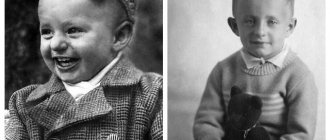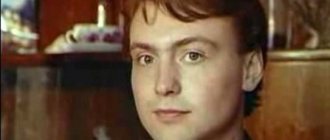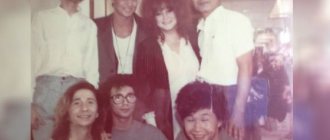Birth name: Menachem-Man Neukhovich Neiman Date of birth: 09.25.1911 Place of birth: Nezhin, Chernigov province Height : 163 cm Zodiac sign: Libra When died : 08.16.1969 Cause of death: lung cancer Where buried: Novodevichy Cemetery
The famous actor and chansonnier Mark Bernes was called an outstanding artist during his lifetime, which does not happen often. His biography and personal life were not always successful. With his songs, the performer inspired Soviet soldiers to victory. His musical compositions were included in the golden fund of the song heritage of the USSR.
The actor's childhood and family
Bernes Mark (real name Menachem-Man Neukhovich Neumann) was born on October 8, 1911 in the Ukrainian city of Nizhyn, Chernigov region. He is Jewish by nationality.
Mom - Fruma-Makhlya Lipovna, did not work anywhere, kept house. Father - Naum Samoilovich, worked at a company collecting recyclable materials. There was always music in their house; the parents introduced their son to art from a young age.
In 1916, the Neumanns changed their place of residence to the city of Kharkov, where Mark spent his childhood and youth. At the age of 7, the boy went to school, and upon graduation he headed to the theater technical school. His parents sent him to master the profession of an accountant.
In parallel with his studies at the technical school, Mark got a job as an extra at the Kharkov Mussoorie Theater. Soon he had a chance to perform in place of the sick artist. The pseudonym Bernes was invented by the young artist right then.
The guy invested himself so much on stage that director Nikolai Sinelnikov even praised him. From that day on, Mark occasionally played small roles in productions.
When the young artist turned 17, having received a certificate of completion of theater courses, Bernes went to Moscow. Here completely different horizons opened up for him. Mark was simultaneously accepted as an extra at the Bolshoi and Maly theaters. He was happy with this kind of work. After some time, directors began to single out the talented artist from the crowd and began to trust him with small roles. The guy considered actor Nikolai Radin his teacher.
Biography
A legend of the Soviet stage, a performer of the most soulful songs, a Russian chansonnier who gave the country dozens of hits, a talented actor. It's all about him, Mark Bernes. His songs warmed the hearts of soldiers during the war, giving them strength to win and create.
Mark Naumovich Neiman, this is exactly what the real name of the singer and artist sounds like, was born in the provincial Ukrainian Nizhyn, Chernigov region (then province) in 1911. His parents - Jews Naum Samoilovich and Fanya Filippovna Neiman - had no direct connection to art, but songs always sounded in their house. The head of the family worked in the Nizhyn artel, which collected waste materials, and the mother was the keeper of the home.
Actor Mark Bernes
When Mark was 5 years old, the family moved to Kharkov. Here the boy went to seven-year school. His interest in art awoke early. And in high school, this interest took shape in the desire to go on the theater stage. Mark Neumann went to the Kharkov Theater College. At the same time, the guy appeared at the Mussoorie theater. Mark was drawn to this scene with incredible force. He begged to be hired as an extra.
Soon the boy was lucky: an opportunity arose to replace a sick actor. Neumann, who took the creative pseudonym Bernes, “gave his best” at the premiere of the play in such a way that he received praise from director Nikolai Sinelnikov, who was stingy with compliments. From that moment on, he was trusted with small roles.
Mark Bernes in his youth
In 1929, when Mark Bernes turned 17, he went to the capital. Real cultural life was in full swing here. Dozens of theaters beckoned with the lights of their ramps. The young artist was accepted into the Maly and Bolshoi theaters at the same time. Again Bernes had to start from scratch: he was hired as an extra. But he was incredibly happy about it.
In the early 1930s, Mark began to be trusted with small roles. His mentor and teacher was the popular actor Nikolai Radin.
Filmography
His film debut took place in 1935. It was an episode in the film “Prisoners”. On the set of the film, Mark met with director Sergei Yutkevich, who was just searching for an actor to play the role of a spy in the film “Miners”.
Artist in his youth
A year later, Yutkevich again directed Mark in his film “Man with a Gun.” In this film, the young artist performed the composition “Clouds over the City of Steel.” After the film was released, Bernes became famous throughout the Union, and the song sung became a folk song.
Films with the actor that the audience loved: “Fighters”, “Big Life”, “Crime and Punishment”.
Glory came at the beginning of the Great Patriotic War. Over 4 years, Bernes starred in 10 films. He starred as pilot Fedenko in “The Last Line”, a commentator in “Valery Chkalov”, General Kozhukhov in “Road to the Stars”, Arkady Dzyubin in “Two Fighters”, Kozyrev in “The Main Land”. The directors liked not only Mark Naumovich's performance, but also his soulful voice. In almost every film he performed a song, and in some more. It often happened that Mark participated in the creation of the film only as a performer, without entering the frame.
Timenote
Mark Naumovich Bernes (real name - Neiman [September 25 (October 8), 1911, Nezhin, Chernigov province - August 16, 1969, Moscow) - Soviet film actor and singer.
The Supreme Council had already prepared a Decree on awarding him the title of People's Artist of the USSR ; it was supposed to be signed in September, but did not have time. They were not awarded posthumously.
Rdna from the best songs of Russia of the twentieth century - Cranes
People's Artist of the RSFSR (1965). Winner of the Stalin Prize, first degree (1951). One of the most beloved Soviet pop artists, an outstanding Russian chansonnier. Largely thanks to Bernes, a golden fund of Russian song classics was formed.
Mark Naumovich Bernes was born in the city of Nizhyn (now a regional center in the Chernigov region of Ukraine) into a Jewish family. His father, Naum Samoilovich Neiman, was an employee in a waste collection artel, and his mother, Fanya Filippovna, was a housewife. In 1916, when he was 5 years old, the family moved to Kharkov.
As a young man, Mark entered the Kharkov musical theater "Missouri" of N. N. Sinelnikov, choosing the stage name Bernes. In 1929 he graduated from theater courses in Kharkov. At the same time, 17-year-old Mark came to Moscow in the hope of finding acting work. Here he worked as an extra in several theaters, including the Small and Bolshoi. In 1930-1933 he played small roles at the Moscow Drama Theater and subsequently considered the artist Nikolai Radin his teacher.
Since 1935 he acted in films. After episodic roles (“Prisoners”, 1936 and “Miners”, 1937), notable roles followed in the films “Man with a Gun” (1938), “Fighters” (1939), “Big Life” (1939). The actor's performance was distinguished by charm and gentle humor. Mark Bernes gained great popularity due to his roles in films about the War. In the film “Two Fighters”, with amazing sincerity and simplicity, he sang the song “Dark Night” (music by N. Bogoslovsky, lyrics by V. Agatov), as well as “Scows” stylized “to Odessa songs.” Bogoslovsky’s songs from films (“Beloved City”, “Dark Mounds Are Sleeping”, “Scows Full of Mullet”, the famous “Dark Night”) performed by Bernes were heard on the radio and recorded on records. Bernes continued to collaborate with Nikita Bogoslovsky and recorded several more of his songs.
Mark Bernes's first public concert took place in Sverdlovsk at the House of Officers on December 30, 1943, followed by a concert tour of the Urals. He began performing in Moscow in the late 1940s, first at evenings in the Houses of the Creative Intelligentsia. On the radio in the “Club of Cheerful Artists” on behalf of his character the driver Minutka (“The Great Turning Point”, 1945) he performed “Song of a Frontline Driver” (“Frontline Path”) by Mokrousov, “It Happens in Life” by Solovyov-Sedogo and others. Continuing to act in films, Bernes paid more and more attention to the stage, which gave him wide scope to realize his own plans. He began to take an active part in creating the repertoire. He made high demands on both music and poetry, and worked for a long time and meticulously with poets and composers. Of the 82 songs in Bernes's repertoire, more than 40 were created by his order or with his direct participation.
In the 1950s-1960s, he created in films complex characters of people with difficult fates - such as Umar Magomet (“Far from Moscow”), Chubuk (“School of Courage”), Radionov (“They Were the First”).
On September 17, 1958, two central newspapers simultaneously began persecuting Bernes . In Pravda, Georgy Sviridov, in the article “Eradicate vulgarity in music,” subjected the artist to unfair and tendentious attacks.
In Komsomolskaya Pravda, in the feuilleton by A. Sukontsev and I. Shatunovsky “Star on the Volga,” Bernes’s of traffic rules was presented in the most gloomy tones as “behavior unworthy of a Soviet artist.” The consequence of these and several subsequent articles was the actual excommunication of Bernes from filming and recording on radio and gramophone records. But since 1960, Bernes’s voice has sounded on the radio again (the title song of the popular Sunday program “Good Morning!” (O. B. Feltsman , lyrics by O. Fadeeva ).
In 1960, at the Luzhniki Stadium, in the program of the Moscow Music Hall, Bernes first performed the song “The Enemies Burned Their Own Hut” by Matvey Blanter to the verses of Isakovsky . Written 15 years earlier, in 1945, and only once heard on the radio then, it found an interpreter in the person of Bernes , who revealed the full tragedy of the work and made the song widely popular.
In 1961, director Pavel Armand was the first to break the ban on inviting Bernes to films, filming him in a small role in his film “The Devil's Dozen.”
In subsequent years Bernes worked successfully again, touring in Poland, Yugoslavia, Czechoslovakia, Romania, Bulgaria, receiving many enthusiastic responses from the media. He has appeared on English television.
His repertoire included the songs “Muscovites” (Andrey Eshpai - Evgeniy Vinokurov ), “If only the boys of the whole earth” ( Soloviev-Sedoy - Dolmatovsky ), “I love you, life” ( Eduard Kolmanovsky - Konstantin Vanshenkin ), “Do the Russians want war" ( Kolmanovsky - Yevtushenko ), "I'm in a hurry, excuse me" (Ya. Frenkel - K. Vanshenkin ), etc.
In the four-part film “Shield and Sword” (1968), the song “Where the Motherland Begins” (V. Basner - M. Matusovsky ) was performed behind the scenes by Bernes. On July 8, 1969, the artist recorded the song “ Cranes ” by Ian Frenkel , with lyrics by Rasul Gamzatov translated by Naum Grebnev .
Mark Naumovich Bernes died on August 16, 1969 from lung cancer. He was buried at the Novodevichy Cemetery (site No. 7). Recordings of his songs were played at the funeral.
***
BERNES (Neiman) Mark Naumovich (25.9.1911–16.8.1969), film actor, pop singer, people. artist of the RSFSR (1965), laureate of the Stalin Prize (1951). The son of an employee of a recycling company. At the age of 17 he left home. Graduated from Kharkov theater courses (1929). From 1929 he worked in Moscow as an extra in several theaters, including the Maly and Bolshoi, but did not achieve much success in the theaters; in 1930–33 he played episodic roles in Moscow. dram theater Since 1935 he acted in films. First means. roles played by B. in films: Krasovsky (“Miners”, 1937), Kostya Zhigulev (“Man with a Gun”, 1938), Sergei Kozhukharov (“Fighters”, 1939). Having absolutely no vocal abilities (and having a rather strong “Odessa” accent), B. gained enormous popularity as a pop singer and lyrical performer. songs. In his performance the songs “Dark Night”, “Scows”, “Beloved City”, “Dark Mounds Are Sleeping” and others gained wide popularity. Since 1943 he has been actively performing in concerts. As an actor, B.'s all-Union fame was brought by his roles in films dedicated to Vel. Fatherland war: Arkady Dzyubin (“Two Fighters”, 1943), driver Minutka (“The Great Turning Point”, 1945), sailor Chmyga (“The Third Impact”, 1948). The best works of the 1950s–60s: Umar Magomet (“Far from Moscow,” 1950), Kosarev (“Taras Shevchenko,” 1951). After the death of I.V. Stalin joined the CPSU in 1953. He continued acting, but his popularity as an actor quickly faded. His most famous roles of this period: Chubuk (School of Courage, 1954), Rodionov (They Were the First, 1956), Ogonyok (Night Patrol, 1957), Colonel (It Happened in the Police, 1963). On Sept. 1958 to the center. The press launched a campaign against B., he was removed from filming and recording on radio and records. In 1960 the bans were lifted; later he sang the popular songs “Enemies Burned My Own Hut”, “Muscovites”, “If Only the Boys of the Whole Earth”, “I Love You, Life”, “Where the Motherland Begins”, “Cranes”, etc. He died of lung cancer.
Best films
The actor's filmography includes 35 films, of which Bernes starred in only 6 films. Mark’s most famous works: “Replacement Player”, “Zhenya, Zhenechka and Katyusha”, “Maksimka”.
In the 50-60s. on the silver screen, Bernes portrayed characters with difficult fates: in the film “Far from Moscow” - Umar Magomet, in “The Cold Sea” - Eremey Lukich Okladnikov, in “School of Courage” - Chubuk, in “They Were the First” - Rodionov, in “ Night patrol" - Ogonyok.
Wikipedia refutes the information that Mark Bernes was involved in the film “They're Ringing, Open the Door.”
There was happiness
Lily left not so much for Bernes as for Lucien. She fell in love with him later. When I saw how important home and family were to him, how he loved children - both his daughter and her son equally as much as he loved her.
Mark Bernes and Liliya Bodrova
She was afraid that Bernes would drink - there were rumors that he respected this matter very much, but in nine years together he did not drink a single glass.
“Let me have a drink instead,” she suggested when the artist was treated very insistently.
Bernes's friends immediately accepted Lilia, the house was always full of good, interesting guests... In general, there was happiness. Of course, there were quarrels, and some - plates were flying around the house. But Lilia knew that her husband could not live without her and was terribly proud of her.
And he was terribly caring. Every three days he sent her her favorite flowers - carnations. And she didn’t even know how much bread was in the store. In order not to separate from his wife, Bernes suggested that she master entertainer and work together. And she began to go on tour with him.
For nine years they did not part at all. It got to the incredible: if Mark went out on business, he called his wife every half hour. And if he was called somewhere alone, he was sincerely amazed:
“You don’t know that I’m married?”
Song repertoire
Bernes became famous as a singer in the late 40s. At first his songs were heard in the Houses of Creative Unions and on the radio. Without ceasing to act, Mark Naumovich devoted more and more time to the stage. Many songwriters dreamed of him performing their compositions. Because the songs that the artist sang quickly became hits, and composers and poets woke up famous.
The performer, having no musical education, made high demands on the texts and musical accompaniment. At the same time, his colleagues recalled that the singer did not know musical notation. There were legends about the intolerable character of the performer among the composers' guild. As a rule, he called them at night or early in the morning and demanded that they rewrite the part of the text they didn’t like, or elements of the melody. After much debate, the creators gave up. After a while, they realized that Mark was right, it was his version that the listener fell in love with.
Latest photos
The heyday of his career in the musical field occurred in the 50-60s. During these years, hits appeared in his repertoire: “Muscovites”, “If only the boys of the whole earth”, “I love you life”.
The song “Enemies Burned Their Home,” performed by Bernes at the Luzhniki stadium in 1960, found a second life. Before him, in 1945, V. Nechaev once sang it, but could not reveal the tragic meaning. Mark Naumovich interpreted the composition in such a way that it became popular.
Subsequently, other songs were released that the whole country sang: “Do the Russians want war,” “I’m in a hurry, excuse me,” “I work as a magician.” The composition “Where the Motherland Begins” was performed in the 4-episode film “Shield and Sword”.
Bernes's repertoire consisted of 82 songs, half of them were written at the request of the performer and under his constant control. Records with his compositions were released in millions of copies and quickly sold out. With the advent of CD players, recordings were transferred to digital format. The album “Unknown Mark Bernes” includes takes of phonograms that have never been published before.
The artist toured extensively throughout his country, and also gave concerts in Bulgaria, Romania, Poland, Czechoslovakia, and Poland.
Brief biography of Mark Bernes
Bernes's career began with cinema. However, he earned the love of his contemporaries and descendants largely thanks to his musical talent. At the same time, the artist did not have any special education and did not understand notes at all. But his calm, serious manner of performance and naturalness on stage captivated the audience.
Childhood and youth, studies
Mark Bernes was born on October 8, 1911 in the city of Nizhyn, Chernigov region. His real name is Menachem-Man Neukhovich Neiman. The artist was from a simple family - his father worked as a ragpicker, his mother was a housewife. When the boy was five years old, the family moved to Kharkov. The future artist spent his childhood and youth there.
Bernes graduated from the seven-year school, after which his parents sent him to the Kharkov school. They wanted their son to become an accountant. The young man's plans for life were completely different, so he dropped out of the trade and industrial school without completing the course. Young Neiman entered the theater technical school and at the same time got a job as an extra at the local Mussoorie theater. On the stage of the Kharkov Theater he played his first role. His work was highly appreciated by director N.N. Sinelnikov, who worked there at that time and was a local celebrity.
During this period, Neumann's stage name arose - Mark Bernes.
Filming
Figure 3. Still from the film “Two Fighters”
At the age of seventeen, Bernes went to Moscow. Straight from the station he went in search of work. The aspiring artist received a place in several capital theaters, including the Bolshoi and Maly. He played small, mostly silent roles. He worked as an extra for seven whole years until, finally, in 1935 he was invited to the cinema.
At the age of 24, he found himself on a film set, where he played several cameo roles in films. The audience liked the actor's charming performance. He was especially good at films with military themes. He created a number of artistic images that were included in the golden fund of Russian cinema, these are:
- Umar Mohammed from the film “Far from Moscow”;
- Chubuk from “School of Courage”;
- Rodionov - the film “They Were First”;
- Ogonyok - the film "Night Patrol".
Interesting! In August 1958, a bell rang in Bernes's apartment. The unfamiliar man turned out to be a representative of criminal circles and a big fan of the artist’s work. It turned out that after the release of the film “Night Patrol,” where Bernes played the role of a man with a criminal past, his life was played at cards. The bandits believed in the reality of the artistic picture and considered the actor a traitor. The artist turned to the criminal investigation department, and while the case was being investigated, security was assigned to him.
Throughout his life, Mark Bernes played more than 50 film roles, most of them of an episodic nature. The actor's achievements in the field of cinema were recognized with several state awards, including the titles of Honored and People's Artist of the RSFSR.
Performing songs
Figure 4. From left to right: Kolmanovsky, Bernes, Yevtushenko
After the release of the film “Two Fighters,” Mark Bernes gained popularity as a singer. He sang in other films, but the compositions from this film brought him popular love. Arkady Dzyubin, the welder-shipbuilder he played, sang two songs: “Dark Night” and “Scows”. They became hits, the whole country sang them.
From this moment on, Bernes begins to be perceived not only as an actor, but also as a singer. His first concert took place on December 30, 1943 in Sverdlovsk. This was followed by a tour of the Urals. He continued to act in films, but his main interest was focused on musical activities. During national concerts, the audience, as soon as they heard the chords of his songs, began to applaud. Bernes was invited to the radio and recorded records.
You may be interested in: Biography of actor Nikolai Kryuchkov.
There was such a story that the first edition of records with the composition “Dark Night” was completely rejected.
Allegedly, the studio workers cried when they worked on recording the disc and ruined the matrix. The management, fortunately, did not punish sensitive women. Table 1. The most popular songs performed by Mark Bernes
| Song name | Composer, lyricist | Note |
| “The dark mounds are sleeping” | N. Bogoslovsky, B. Laskina | The lyrical song was first performed in the film “Big Life” |
| "Dark night" | N. Bogoslovsky, V. Agatova | Song from the movie “Two Fighters” |
| "Scows full of mullet" | N. Bogoslovsky, V. Agatova | Song from the movie “Two Fighters” |
| “For three years I dreamed about you” | N. Bogoslovsky, A. Fatyanova | Composition from the second part of the film “Big Life” |
| "When a Distant Friend Sings" | B. Mokrousova, Y. Helemsky | The song is dedicated to the French performer Yves Montand |
| “Why didn’t you meet me?” | N. Bogoslovsky, N. Dorizo | Song-romance from the film “Different Fates” |
| "I love you life" | E. Kolmanovsky, K. Vanshenkin | It was written specifically for Bernes, and was subsequently performed by Joseph Kobzon, Vizbor, Boris Moiseev and many others |
| “Do Russians want war?” | E. Kolmanovsky, E. Yevtushenko | A record with this song was presented as souvenirs to participants of the International Congress for General Disarmament and Peace |
| "The Volga River Flows" | M. Fradkin, L. Oshanina | The song was written for the film “The Volga Flows”. The authors of the composition wanted Bernes to perform it, but he did not like it. In the film it was sung by Vladimir Troshin. Performed by Bernes, it was first heard on the radio program “Good Morning!” |
| “Enemies burned my hut (Praskovya)” | M. Blanter, M. Isakovsky | The song was rejected by the Soviet leadership, but Bernes gave it a second life by performing it at one of the concerts |
| "Where the Motherland Begins" | V. Basner, M. Matusovsky | Song from the movie "Shield and Sword" |
| "Huge Sky" | R. Rozhdestvensky, O. Feltsman | The plot of the song is based on real events |
| "Cranes" | Y. Frenkel, R. Gamzatov, Russian text by N. Grebnev | The song was recorded a month before the artist's death |
Bernes's repertoire includes more than 80 compositions. More than 40 of them were created with his personal participation. He had high demands on words and music.
Friends, acquaintances
Bernes's comrades admitted that the actor was a complex person. He could be characterized by many mutually exclusive epithets:
- kind angry;
- simple - cunning;
- gullible – suspicious, etc.
It was all about him. He combined many qualities. He reserved the best of them, such as his boundless charm, for the stage.
Bernes felt the song very subtly, sometimes forcing the authors to change the verses or make a different arrangement. And he always got to the point. There is a known case when he flatly refused to sing the song “For Three Years I Dreamed of You,” which was sure to be heard from the lips of his hero in the film “Big Life.” He left the site with a scandal, but returned to work the next day. He said that he felt the composition and loved it.
Personal life of the actor
The artist’s first wife, Paola (Polina) Semyonovna Linetskaya, worked at the Korsha Theater. When the young people met, she was married to an engineer. The woman chose Mark Naumovich, and in 1932 the couple registered a relationship. In 1954, a daughter, Natasha, was born into this marriage. She subsequently graduated from the Institute of Oriental Languages and now lives in the USA.
The artist with his daughter Natasha
Polina died 2 years after the birth of the girl from cancer. For Bernes this was a strong blow. He loved his wife very much, but during the 2 months that she was ill, he never visited her. Before this, Mark’s sister and father died of cancer in Mark’s family; the artist feared that he, too, might contract the contagious disease. He told the housekeeper to divide the house into 2 parts and divided things up. No one could convince Bernes that oncology is not transmitted by airborne droplets.
Mark saw his second wife, Lilia Bodrova, on September 1, 1960. At their first meeting, he decided that he would take her away from her husband. They brought the children to 1st grade: Bernes’s daughter Natalia, the woman’s son Jean. The children quickly became friends, which subsequently brought their parents closer.
He was happy with Liliya Bodrova
Artist with children
Just 2 months later, Lilia, who was 17 years younger than the artist, took her son and left her husband, a famous photojournalist for the Pari-Match publication, for Mark. She was tired of his constant affairs on the side. Since then they have not parted. Bodrova hosted the singer's concerts. Bernes adopted Jean. After graduating from school, he entered the camera department of VGIK, and now lives in Moscow.
On the school line
Fate smiled at him again in the most unexpected place - at the school assembly on September 1st. The artist took his first-grader daughter to school, and there he met a very nice woman who brought her son with her husband. It was Lilia Bodrova.
Lilia's first husband Lucien was a famous photographer and he was half French. Having accidentally met Lilia abroad, Lucien came to Moscow and searched for her for two years. He found it, achieved it, they got married - and now they have brought their son to school. It seems that such love is not afraid of anything, but then someone very familiar entered the schoolyard.
- Look, Kryuchkov is coming! - Lily tugged at her husband’s sleeve. “Not Kryuchkov, but Bernes,” the husband corrected.
That's how they met. Bernes tried his best to get close to Lilia, and even specially flew from tour to the parent meeting to see her. Their children sat at the same desk, so the artist had great opportunities for courtship. He always invited Lilia either to some private show or to a prestigious concert... This went on for two months, and then Bodrova left her husband and moved to Bernes. She was 30 years old, he was 48...
“But the amazing smile, the cunning squint - all this remains. He could come up, put his hand on her shoulder - and the woman was ready for anything.”
Her first husband was a well-known man in the capital, only he had a Chevrolet car in Moscow, and everyone she knew was shocked: to leave such a man? But Lucien, despite all his love for his wife, was an incorrigible womanizer. Lilia tried to leave him several times, he fell at his feet, swore that this was the last time, that he would never, never again... And she did not leave, she did not have enough strength. But she felt bad.
“Some women put up with this - I didn’t want to forgive cheating. I needed to get away from that family, and Mark did everything so that I would go to him.”
Cause of death
In the summer of 1969, after a concert, the singer became ill and lost consciousness backstage. The doctors who came to the call suggested that the artist had infectious radiculitis. But after a more thorough examination, a disappointing diagnosis was announced - inoperable lung root cancer.
Knowing about the doctors’ conclusion, on July 8 Bernes recorded the song “Cranes” from the first take. He died on August 16, 1969. The artist was buried in Moscow at the Novodevichy cemetery. During the funeral procession, instead of a funeral march, songs were performed by a singer. This was his last wish.
Monument at the grave of the great artist
Due to his premature death, he was never given the title of People's Artist of the USSR. Fans already considered Mark Naumovich a people's hero.
After her father's death, Natalya stopped all communication with Lilia. The widow's own son also quarreled with his mother over the apartment. Bodrova set up a museum in it, which Jean really didn’t like. A scandal broke out between them.
When Liliya Mikhailovna died in 2006, it turned out that shortly before that she had sold the apartment to Dmitry Pashkov for 1 million 723 thousand rubles. The woman wanted him to brighten up her loneliness and take care of her.
Having learned about this, the children came together. A trial followed, which dragged on for a year, but the apartment was returned to Jean and Natasha. According to Bodrova’s will, the interior decoration and archives of her grandfather were transferred to her granddaughter Lyudmila.
Where is he buried?
Initially, the artist was supposed to be buried at the Vagankovskoye cemetery next to the grave of his first wife. However, he himself wanted to find peace at the Novodevichy cemetery. During the Soviet years, it was customary to bury only people's artists of the USSR there. They did not manage to assign this title to Bernes during his lifetime, but they still went to meet his last wish.
Figure 2. Bernes’s grave at the Novodevichy cemetery
Mark Bernes was seen off on his last journey to the sounds of his songs, one of which was recorded on the eve of his death, namely “Cranes.” Performed by Bernes, it gained wide popularity.
Interesting! Rasul Gamzatov's poems were originally dedicated to horsemen who died in battles. With the consent of the author, “horsemen” were changed to “soldiers” and some other changes were made.
The song “Cranes” performed by Mark Bernes.
Memory of the actor
The following facts indicate that Mark Naumovich is remembered and loved:
- in 1978, a small planet was named after him - 3038 Bernes;
- a memorial plaque was installed on the house in which the artist lived in recent years in 1996;
- on the occasion of the 100th anniversary of the singer’s birth in 2011, an updated memorial plaque appeared on the house in which Bernes was born;
- in 2011, a bronze monument to the artist was unveiled. But it stood in Theater Square for a short time; in 2020, the monument was stolen. A day later the monument was found, but in pieces;
- in 2020 in Kharkov, by decision of the city council, Shchorsa Street was renamed in honor of Bernes.
One of the streets of Kramatorsk is named after Mark Naumovich.
Childhood
Nahum Neiman served in an artel that collected recyclable materials, and his mother did household chores. It was customary in those days for a woman to stay at home.
In 1916, the whole family moved to Kharkov, where Mark completed his seventh year. The parents dreamed that their son would become an accountant, but the teenager has other plans - he is attracted to the stage. He studies at a theater technical school and at the same time works as an extra in the theater. As in a fairy tale, one of the actors fell ill, and Mark was released on stage as a waiter in an operetta, for the performance of which he was praised by director N. Sinelnikov. At the same time, the sonorous pseudonym Bernes appeared.
Work after marriage
Mark Naumovich worked hard and successfully. He toured both around the country and abroad. In 1961, a new song “Do the Russians Want War” appeared. Yevtushenko himself said that Bernes made so many amendments that it is impossible to remember what exactly Mark Naumovich suggested.
He went on tour to Poland, Yugoslavia, Romania, Czechoslovakia, and Bulgaria. He has appeared on English television. His wife accompanied him on all his trips. He refused to perform without her. In 1968, everyone enthusiastically accepted the new film “Shield and Sword,” and Bernes performed the song “Where the Motherland Begins.” Already seriously ill, a month before his death he recorded the song “Cranes” the first time.
The popularly beloved artist died on August 16, 1969. He was buried at the Novodevichy cemetery, with four of his songs performed, which he chose himself.
These are “For Three Years I Dreamed of You”, “Romance Roshchina”, “I Love You, Life” and “Cranes”. Thus ended the busy life of the artist we know as Mark Bernes. A brief biography of the performer is presented in the article.











